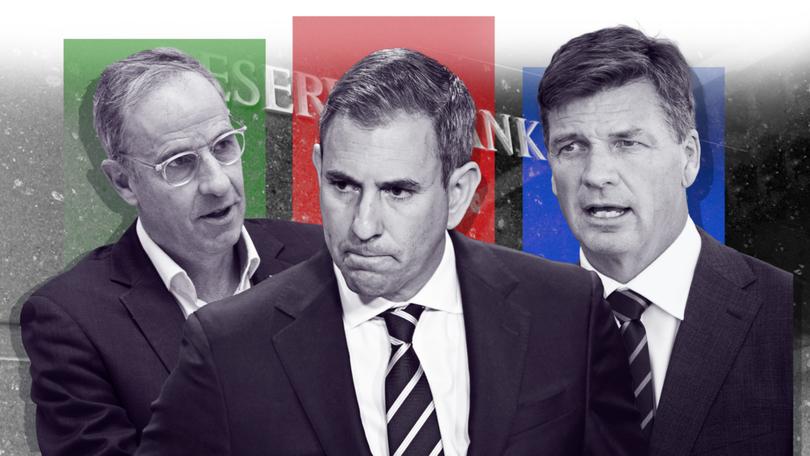Treasurer Jim Chalmers disappointed at Coalition move to oppose RBA restructure, threatens deal with Greens
Treasurer Jim Chalmers says he could be forced to negotiate with the Greens on a planned overhaul of the Reserve Bank after the Opposition said it would not support the legislation.

Treasurer Jim Chalmers will be forced to deal with the Greens – including demands the Reserve Bank be allowed to pump money into clean energy – to pass his planned overhaul of the central bank after the Coalition walked away from negotiations.
Shadow treasurer Angus Taylor said on Tuesday the Coalition would oppose legislation that splits the RBA’s structure to create separate boards dealing with interest rates and governance arrangements – even if Dr Chalmers gives in to his demands.
He raised fears the Government would seek to “stitch up the Reserve Bank board” because it would not agree to a demand that all members of the current board automatically transfer to the new monetary policy board.
Sign up to The Nightly's newsletters.
Get the first look at the digital newspaper, curated daily stories and breaking headlines delivered to your inbox.
By continuing you agree to our Terms and Privacy Policy.Mr Taylor accused Labor of pursuing a “sack and stack” strategy and said last week’s heightened rhetoric attacking the RBA made this clear.
“Frankly, over the last 10 days our concern about the motives of this government with respect to this (RBA) review have only deepened,” he said.
“There’s been no lack of clarity about what we expected from the start, and sadly, the Government having brought forward legislation that doesn’t get to where we need it to, and having spent the last week or so out there bagging the Reserve Bank, I think it’s time to move on.”
Dr Chalmers said he had been working constructively with Mr Taylor since April last year and had made compromises in six areas including the arrangements to transfer the board.
Under his compromise, all current board members would transfer to the new monetary policy grouping unless they didn’t want to.
Mr Taylor insists all members of the current board must be automatically moved over to ensure continuity in monetary policy.
But Dr Chalmers indicated there were some board members who might prefer to be on the governance board – although he would not name them – and said it was the preference of RBA governor Michele Bullock that there be continuity on both of the new groupings.
Asked whether the board members should be forced to sit on one body when they would prefer to be on the other one, Mr Taylor said Dr Chalmers should explain the process.
“I tried to take the shadow treasurer seriously, even though nobody else appears to, (but) we have always been hostage to the shadow treasurer’s ability to carry an argument internally,” Dr Chalmers said early on Tuesday morning.
“The view that they’ve expressed today is irresponsible, it’s disappointing, but it’s not surprising, because they always put politics before economics.”
He suggested it would be open to board members to resign and seek appointment to the governance board if they wished.
The Government will now consider its next steps, which may include turning to the Greens and other crossbench senators for a deal despite the Treasurer’s preference for a bipartisan arrangement between the major parties.
The Greens are less concerned about the arrangements for the two boards, but they want to see existing provisions in the legislation remain untouched to allow the Government of the day to overrule RBA decisions and also to allow the central bank to extend credit to productive areas of the economy.
Mr Taylor also asked for the provision for the Government to retain final say, known as section 11, to stay intact but Dr Chalmers offered a compromise deal that would see it narrowed.
That particular section has never been used.
Greens economic spokesman Nick McKim said nonetheless, the democratically elected government should maintain oversight.
“Instead of leaving those decisions to unaccountable, unelected technocrats, the high priests of neo-liberalism on the board of the RBA, Dr Chalmers, should actually be using the powers that he’s got, the powers that he is accountable for to the Australian people and provide some relief,” he said.
Ms Bullock said last month that she was happy with the legislation as proposed by the Government.
“Ultimately, though, this is a matter for the parliament and the government and its dealings with the crossbenches. I would like it to pass because I would like things to settle down,” she said.

